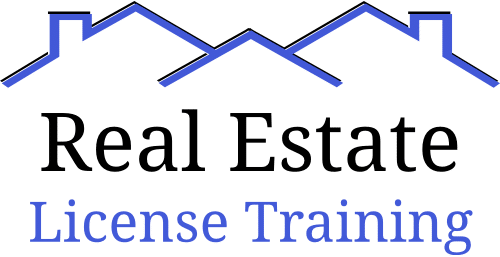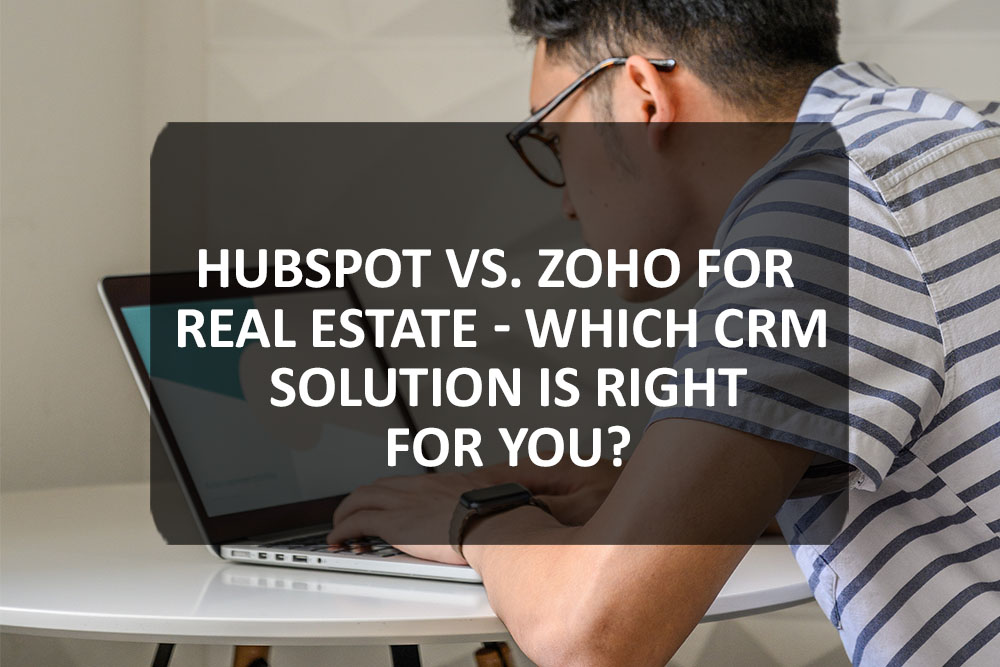Looking for the best CRM solution for your real estate business?
You’ve come to the right place.
You see, your job is to deal with property, meet with prospective buyers, advise clients about market conditions, and so on.
And while you’re an expert at those things…
…you might not know much about software and CRM solutions.
That doesn’t mean you don’t need them.
In fact, the right CRM solutions will help you streamline your processes, manage your leads, turn leads into sales at the right time, and more.
It’ll also help you communicate better with your team and collaborate on projects in real-time.
In other words, CRM solutions will make running your real estate business easier, simpler, and more enjoyable.
But which CRM solutions should you choose?
In this blog, we’ll dive into HubSpot vs Zoho for real estate, and help you decide which one will fit your business’s specific requirements.
Ready?
Let’s go!
What Are HubSpot and Zoho?
HubSpot and Zoho are two of the leading CRM solutions today.
Let’s take a quick look at each one of them.
HubSpot CRM
Source: hubspot.com
HubSpot CRM was built around the idea that in general, people don’t want to feel “sold.” They want to feel helped by companies instead of being rammed down a funnel and forced to buy.
With that in mind, HubSpot developed a user-friendly, intuitive CRM solution that allows you to meet leads and prospects exactly where they are in the buyer journey.
It includes features such as data storage and reporting so you can always stay in tune with your leads and customers, email automation, landing page building, chatbot creation, and more.
Zoho CRM
Source: zoho.com
Zoho CRM is a popular solution used by 250,000 businesses in 180 countries. It caters to all kinds of businesses including B2B, B2C, Enterprise, and SMBs.
On the ground level, it’s very similar to HubSpot in that its goal is to help companies build great relationships with their leads and prospects.
However, it differs slightly from HubSpot when it comes to API, integration, and pricing schemes.
TLDR; HubSpot vs. Zoho
HubSpot CRM and Zoho CRM are two popular customer relationship management solutions.
However, just like everything else, they’re not created equal.
While Zoho gives you the chance to get a ton of features for affordable pricing…
…HubSpot focuses on quality, with an extensive ecosystem of integrations, praise-worthy customer support, flexibility depending on where you are in business, and user-friendliness.
Of course, there are no fixed rules as to which CRM solution you should pick at the stage of business you’re in right now.
But my suggestion is this:
If you’re just starting out and want access to a ton of features for a low price, go for Zoho CRM.
If you can afford more and want a massive array of features, flawless customer service support, and a flexible, simple, enjoyable experience…go for HubSpot CRM.
Now, let’s dive deeper into the details.
What Is the Difference Between Zoho and HubSpot?
HubSpot and Zoho are basically the same in that they have the same goal.
Their goal is to allow you to foster stronger, better, more profitable relationships with your leads, prospects, and clients.
So, should you choose HubSpot or Zoho?
My answer: it depends.
Both these CRM solutions provide awesome features, so your choice will depend on the way you work and your specific business needs.
Don’t worry, though.
In this section, I’ll give you a rundown of the features of both CRM solutions so you can see how they level up against each other.
HubSpot vs Zoho: Pricing
Pricing is important.
Of course.
You don’t want to spend a ton of money and break your budget, especially if you’re just starting out and your funds are limited.
Great news: both HubSpot and Zoho cater to small businesses, which means they have FREE, flexible, or affordable plans to choose from.
Let’s start with HubSpot.
One thing people love about HubSpot is that you can use it for FREE, forever.
Yup!
If you run a tiny business that doesn’t have a ton of needs, you can grab their free plan and use all the features included there. No strings attached. No credit card needed.
The best part is there’s no expiration for the FREE version, so you can use it for as long as you need to.
If your company remains small throughout the years, you’ll never again need another CRM solution.
However, if you grow (which I assume you will), you can upgrade to their $18/month Starter plan. This includes a tad more features, plus support.
Check it out:
Source: app.hubspot.com
After that, they also have Professional and Enterprise plans, which are much pricier and geared towards larger businesses.
Source: app.hubspot.com
Now, let’s get into Zoho pricing.
Zoho does have a FREE version, but unlike HubSpot, it’s more of a trial version that you won’t be able to use sustainably for your business.
The good news, though, is that their paid plans won’t cost you an arm and a leg.
In fact, you can get started at $14/month for a one-user plan.
Plans go up to $52, which really isn’t much, when you consider that HubSpot’s higher-tier plans range from hundreds to thousands of dollars.
Source: zoho.com
So based on pricing, should you go for HubSpot or Zoho?
Best answer: in the end, you should base your decision on your needs and resources.
If you’re a tiny company looking for a FREE solution you can use forever, go for HubSpot.
If you can afford at least $40/month and you want a ton of features, go for Zoho.
If you’re a huge company and you need comprehensive CRM with sales, marketing, and other intuitive features, go for a higher-tiered HubSpot plan.
HubSpot vs. Zoho: Features
Of course, pricing isn’t the only consideration to make when choosing between HubSpot and Zoho.
You’ll also need to think of features.
In fact, my opinion is that features may even be a tad more important than just pricing.
There’s good news, though: HubSpot and Zoho have similar features.
Both of them give you data on your leads and prospects, allow you to communicate effectively with your team, offer collaboration options, and so on.
That’s exactly why these two giants are listed as alternatives to each other.
Yup!
Check it out.
In this blog, HubSpot lists itself as the best Zoho alternative.
Source: google.com
And in this blog, Zoho deals with FAQs from people migrating from HubSpot to Zoho.
Source: zoho.com
The bottom line is, the features of these two popular CRM solutions are almost equal.
What it boils down to now is pricing, but that’s not hard to understand either.
To put it simply, what you pay for is what you get.
You can use HubSpot CRM absolutely free forever, but only if your real estate business stays small.
Or you can get an affordable Zoho CRM plan, which has more features than HubSpot’s free version.
But if you’re looking for even more features and an all-in-one CRM/sales/marketing platform, you can go for HubSpot’s more expensive plans.
HubSpot vs. Zoho: User-Friendly Interface
As a real estate expert, you probably want to stick to what you do best:
Running your real estate business.
You don’t want to become a tech whiz or software guru.
That’s completely understandable, which is why one main feature you need to look for in CRM solutions is user-friendliness.
Yup, you don’t want to spend days or even weeks scratching your head and zoning out in front of your computer, with no idea what to do.
You also don’t want an extremely long learning curve.
With that, you’ll be happy to know that both HubSpot and Zoho are easy to use.
Here’s a quick look at their dashboards.
HubSpot’s:
Source: app.hubspot.com
Zoho’s:
Source: crm.zoho.com
Keep this in mind, though:
Although both HubSpot and Zoho give you a smooth, easy way to manage your customer relationships in the long run…
…HubSpot is easier to use than Zoho.
In fact, it’s been ranked the most user-friendly CRM software.
Source: sea.pcmag.com
Not that Zoho is hard to use.
But if your #1 scoring criteria is user-friendliness, I suggest that you choose HubSpot.
HubSpot vs. Zoho: Support
When using any kind of software, it won’t be unusual for you to run into problems.
And the first person you’ll think of to ask help from is a member of the support system.
Right?
That’s why checking out how well a company does in the customer support area is crucial.
So, which one is better: HubSpot or Zoho?
In this case, I’ll have to go with HubSpot.
HubSpot prides itself on excellent support, giving you a wide range of channels through which you can communicate with them.
Depending on what’s most comfortable for you, you can jump on a voice call, chat, or even talk to them through social media channels!
Unfortunately, Zoho doesn’t do that great.
When you send them a message, it takes time for them to get back to you.
Of course, you can always go with asking their chatbot, Zia, to answer your questions.
Source: crm.zoho.com
But if you’d rather rely on real-time help and prefer talking to a real person, you’ll be more satisfied with HubSpot.
HubSpot vs. Zoho: Customization
Your business is unique.
This means you need software solutions that you can customize to fit its needs.
Good news: both HubSpot and Zoho are flexible, customizable CRM solutions.
Zoho was created to fit most industries, plus it has a feature called Marketplace, where you can download and integrate all kinds of apps and extensions.
Source: crm.zoho.com
In a different way, HubSpot is also flexible and customizable.
It’s designed to grow with your business, meaning that you don’t need to pay for features you won’t be using.
HubSpot vs. Zoho: Integrations
Here’s something you should keep in mind when choosing your a CRM solution:
You won’t use it on its own.
Instead, you’ll integrate it with a ton of other apps and programs.
Doing so will make your work faster, easier, and more efficient.
Now, here’s what you’ll love about HubSpot.
It has over 700 integrations.
Check out just a few of them:
Source: app.hubspot.com
Of course, Zoho also has a wide range of apps in their Marketplace.
However, these aren’t as comprehensive as HubSpot’s – plus with the limited customer service support, you could find yourself trudging along with a less-than-great user experience.
Does HubSpot Work with Zoho?
Still on the fence about HubSpot vs. Zoho?
I hear you.
Both CRM solutions are awesome, plus really similar.
So if you feel torn and can’t decide on one right now…
…why not choose them both!
Yup.
HubSpot integrates nicely with Zoho, and you can use each’s features to work seamlessly with the other’s.
In fact, it’s not unheard of for businesses to use both CRMs dependently for a long time.
Plus, you can always decide later down the road and cut the one you like less out of your system.
HubSpot vs. Zoho for Real Estate: Which One Is Best for Your Business?
The truth is, there’s no such thing as perfect CRM solutions.
Perfection will depend on you, what kind of business you run, the way you work, and a ton of other facts.
So, what do you do when you’re faced with the HubSpot vs. Zoho question?
Simple.
You can try them both out to see which one fits you best.
However, if this idea doesn’t appeal to you, you can go for a minimum viable solution.
If you own a small business and want to use a ton of CRM features for an affordable price, I suggest you go for Zoho.
However, if your business is growing and thriving, and you want a large ecosystem of integrations, flexible pricing depending on your size and need of features, and awesome support, go for HubSpot.
Image credits:
All screenshots taken by the author, October 2021.

